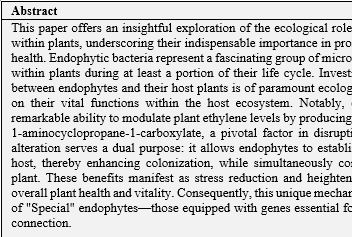Bacterial Endophytes
Unveiling Their Influence on Plant Growth, Yield, and Sustainable Agriculture
DOI:
https://doi.org/10.54117/ijamb.v2i1.13Keywords:
Endophytes, endophytic bacteria, microorganisms, plants, agricultureAbstract
This paper offers an insightful exploration of the ecological roles played by endophytic bacteria within plants, underscoring their indispensable importance in promoting overall plant growth and health. Endophytic bacteria represent a fascinating group of microorganisms that take up residence within plants during at least a portion of their life cycle. Investigating the intricate interactions between endophytes and their host plants is of paramount ecological significance, shedding light on their vital functions within the host ecosystem. Notably, certain endophytes possess the remarkable ability to modulate plant ethylene levels by producing the enzyme bacterial deaminase 1-aminocyclopropane-1-carboxylate, a pivotal factor in disrupting host plant physiology. This alteration serves a dual purpose: it allows endophytes to establish a robust connection with the host, thereby enhancing colonization, while simultaneously conferring benefits upon the host plant. These benefits manifest as stress reduction and heightened root growth, contributing to overall plant health and vitality. Consequently, this unique mechanism has given rise to the concept of "Special" endophytes—those equipped with genes essential for maintaining this internal plant connection.

Downloads
Published
How to Cite
Issue
Section
License
Copyright (c) 2023 El-Hadji Seydou Mbaye, Simone Brogi, Muhammad Akram, Umme Laila, Rida Zainab, Naveena Thotakura, Edward C. Destiny, Chinweike U. Dokubo, Atheer Kadhim Ibadi, Download the PDF file to view the full list

This work is licensed under a Creative Commons Attribution 4.0 International License.
